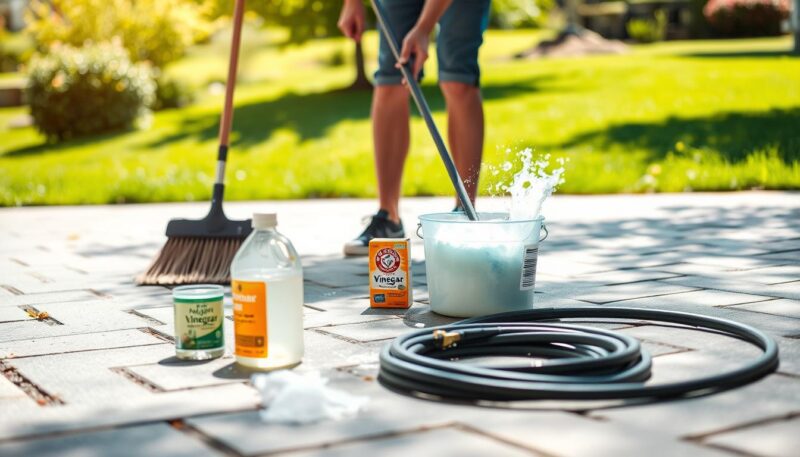Enhancing the curb appeal of your home is a rewarding endeavor, and a crucial part of this transformation is maintaining a clean driveway. Achieving this without a pressure washer is entirely possible thanks to effective DIY driveway cleaning methods. Whether your driveway is concrete, asphalt, or paver, simple and eco-friendly cleaning options ensure your driveway remains in top condition. Regular cleaning not only boosts the appearance of your driveway but also prolongs its lifespan.
Understanding the different surfaces of driveways helps in selecting the most effective cleaning solutions tailored to each material. Concrete driveways are porous and prone to staining, while asphalt driveways, being less porous, are still susceptible to damage if mistreated. Paver driveways, consisting of brick, stone, or concrete, also require gentle handling to prevent damage. Gravel driveways primarily need debris removal and weed control.
Begin the cleaning process by removing any vegetation and debris using a broom or a leaf blower. For thorough cleaning, you’ll need a stiff nylon-bristled pole brush and a bucket of hot, soapy water. This technique ensures dirt and grime are tackled effectively. Employ the hot water cleaning method as it helps in loosening stubborn dirt. By following these steps, you’re on your way to maintaining driveway appearance with simple yet effective cleaning solutions.
Oil stains can be a common issue and require specific attention. Fresh stains can often be absorbed using cat litter, while older stains might need a more robust approach like commercial degreasers such as WD-40.
The importance of regular maintenance cannot be overstressed. Addressing stains promptly, applying a sealant every few years, and regular sweeping are all recommended to keep driveways in pristine condition. Additionally, careful cleaning ensures pollutants like oil do not wash into local waterways, thus contributing to environmental preservation.
While professional services come with the advantage of commercial-grade equipment, implementing DIY driveway cleaning methods can be a cost-effective and satisfactory solution for routine maintenance. With these strategies, you’ll find that maintaining a clean, appealing driveway is both attainable and gratifying.
Step-by-Step Guide for Cleaning Driveway Without Pressure Washer
Cleaning your driveway without a pressure washer is entirely feasible with the correct knowledge and approach. This step-by-step guide will illuminate the process, making it simple and safe. Familiarize yourself with the tools needed, necessary safety precautions, and the specific techniques suited to various types of driveway surfaces.
Tools and Materials You Will Need
- Broom
- Scrubbing brush
- Bucket
- Environmentally safe cleaning agents
These tools are essential for tackling common stains and removing mold and mildew effectively from your driveway. From general cleaning to addressing specific issues, having these tools handy will make the task more manageable.
Safety Precautions to Take
- Wear protective gloves
- Avoid slippery surfaces
- Ensure proper ventilation when using chemical cleaners
Implementing these safety precautions will help you avoid accidents and ensure a safer cleaning process. Keeping these in mind is crucial, especially when dealing with various chemicals and cleaning agents.
Types of Driveway Surfaces and Cleaning Techniques
Different types of driveway surfaces require specific cleaning methods. For instance:
- Concrete Driveways: Use biodegradable soaps and a scrubbing brush to remove common stains. For tougher stains like oil, pre-treat with baking soda or a commercial stain remover before scrubbing.
- Asphalt Driveways: Opt for trisodium phosphate, bleach, or baking soda solutions for the best results.
By understanding the types of driveway surfaces, you can apply the proper techniques for removing mold and mildew as well as addressing different kinds of common stains and how to remove them. This will not only restore your driveway’s appearance but also extend its lifespan.
Rinse thoroughly after scrubbing to ensure all cleaning agents are removed, preventing potential damage to adjacent plant life. With these steps, you can maintain a clean, safe, and attractive driveway without relying on a pressure washer.
Conclusion
Incorporating a regular cleaning schedule for your driveway is not only about aesthetics but about safeguarding your home investment. Regular maintenance can significantly enhance curb appeal and potentially increase your property value, especially if you’re considering selling your home. Adopting seasonal cleaning tips helps in managing frequent upkeep, preventing future stains effectively.
Different DIY solutions, such as using white vinegar or baking soda, can be highly effective cleaning solutions for various driveway surfaces. These methods are not only efficient in removing dirt, grime, and stains but are also environmentally friendly, ensuring the safety of your pets and surrounding plants.
Consistently cleaning and sealing your driveway can help prolong its life and appearance. Tools like a stiff bristle brush and natural cleaners like a vinegar-water mixture prove to be remarkably effective. For concrete driveways, applying a sealer post-cleaning can prevent future stains from oil or grease, maintaining that spotless look. By taking these steps, you guarantee that your driveway remains in pristine condition, reflecting care and attention.

